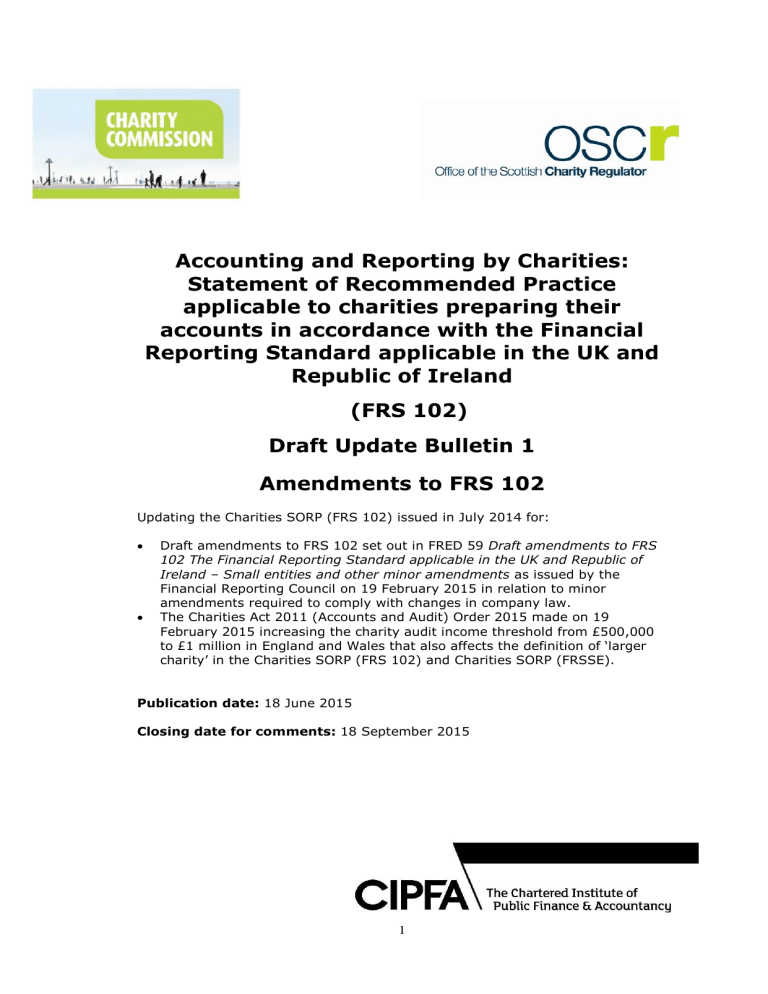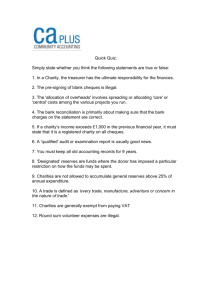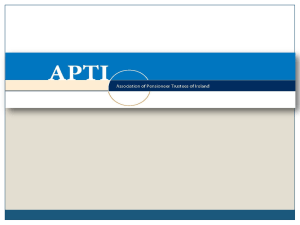Update Bulletin - Charities SORP

Accounting and Reporting by Charities:
Statement of Recommended Practice applicable to charities preparing their accounts in accordance with the Financial
Reporting Standard applicable in the UK and
Republic of Ireland
(FRS 102)
Draft Update Bulletin 1
Amendments to FRS 102
Updating the Charities SORP (FRS 102) issued in July 2014 for:
Draft amendments to FRS 102 set out in FRED 59 Draft amendments to FRS
102 The Financial Reporting Standard applicable in the UK and Republic of
Ireland – Small entities and other minor amendments as issued by the
Financial Reporting Council on 19 February 2015 in relation to minor amendments required to comply with changes in company law.
The Charities Act 2011 (Accounts and Audit) Order 2015 made on 19
February 2015 increasing the charity audit income threshold from £500,000 to £1 million in England and Wales that also affects the definition of ‘larger charity’ in the Charities SORP (FRS 102) and Charities SORP (FRSSE).
Publication date: 18 June 2015
Closing date for comments: 18 September 2015
1
Background
All Statements of Recommended Practice (SORPs) are developed within the context of law and accounting standards. This is made explicit in paragraph 3 of the Charities SORP (FRS 102) which states that:
“This SORP provides guidance on how to apply FRS 102 to charity accounts and it should be noted that in the hierarchy established in accounting standards, FRS 102 requirements and legal requirements take precedence over the SORP. Therefore, should an update to FRS 102 or a change in relevant legislation be made after the publication of this SORP, any of the provisions of this SORP that conflict with the updated FRS 102 or relevant legislation cease to have effect.”
Purpose
The purpose of SORP Update Bulletins is to amend the text of the underlying
SORP for changes in Accounting Standards and legislation subsequent to the
SORP’s issue.
The amendments set out in the Update Bulletins apply to all charities in the
United Kingdom and Republic of Ireland that follow this SORP, unless otherwise stated, for reporting periods beginning on or after 1 January 2016.
2
1 Introduction
1.1
This Update Bulletin is proposing the following minor amendments to the text of the Accounting and Reporting by Charities: Statement of
Recommended Practice applicable to charities preparing their accounts in accordance with the Financial Reporting Standard applicable in the UK and Republic of Ireland (FRS 102) issued in July 2014:
Accounting and Reporting by Charities: The Statement of
Recommended Practice (SORP) - Scope and Application module: inserting from when the amendments in this Update Bulletin are effective;
Module 6: Donated goods, facilities and services, including volunteers: amending the measurement basis of the carrying value for inventories held for distribution at no or nominal consideration to require their measurement at the lower of cost adjusted, when applicable, for any loss of service potential and replacement cost. The bulletin offers a definition of ‘replacement cost’;
Module 10: Balance Sheet and Module 24: Accounting for Groups and the Preparation of Consolidated Accounts: revising the maximum period over which goodwill and other intangible assets may be amortised from five to ten years in those exceptional cases where an entity is unable to make a reliable estimate of the asset’s useful economic life;
Module 12: Impairment of assets: prohibiting the reversal of impairment losses for goodwill;
Module 17: Charity mergers: prohibiting merger accounting for charities that are companies and enter into a business combination with a third party; and
Appendix 1: Glossary: amending the definition of larger charities.
1.2
No changes other than those set out in this Update Bulletin are proposed to the Charities SORP (FRS 102) as a result of the other minor
1.3
amendments set out in FRED 59 Draft amendments to FRS 102 The
Financial Reporting Standard applicable in the UK and Republic of Ireland
– Small entities and other minor amendments.
FRED 59 also proposes amendments to FRS 102 in relation to small entities. Proposed amendments to the Charity SORPs in relation to small charities are dealt with in a separate consultation Withdrawal of the
Charities SORP (FRSSE) and proposals to widen the scope of Charities
SORP (FRS 102).
1.4
Where amendments are proposed to the Charities SORP (FRS 102), these are indicated as follows:
deleted text is struck through; and
inserted text is underlined.
3
2 Proposed Amendments
Accounting and Reporting by Charities: The Statement of Recommended Practice
(SORP) - Scope and Application module
2.1
It is proposed that paragraph 18 in the Scope and Application Module of the Charities SORP (FRS 102) is amended to clarify from when the changes being proposed by this Draft Update Bulletin are effective .
2.2
The following paragraph sets out the draft amendments to:
18. This SORP is applicable to the accounts of relevant charities for reporting periods beginning on or after 1 January 2015. In those jurisdictions where the applicable SORP is specified in regulations, this SORP cannot be adopted until the applicable regulations are made allowing its application. In [month] 2016 amendments were made to this SORP to incorporate amendments necessary to maintain consistency with accounting standards and changes in charity audit thresholds in England and Wales. [These amendments in draft Update Bulletin 1] are applicable for accounts of relevant charities for reporting periods beginning on or after 1 January 2016.
Module 6: Donated goods, facilities and services, including volunteers
2.3
FRED 59 proposes that inventories held for distribution at no or nominal consideration shall be measured at the lower of cost adjusted, when applicable, for any loss of service potential and replacement cost.
2.4
The following paragraph sets out the draft amendments to Module 6:
Donated goods, facilities and services, including volunteers:
6.12. The cost of any stock of goods donated for distribution to beneficiaries is deemed to be the fair value of those gifts at the time of their receipt. If the goods held are to be distributed freely or for a nominal consideration, then the carrying amount should be subsequently adjusted to reflect the lower of cost adjusted for any loss of service potential and replacement cost.
Where replacement cost is the economic cost incurred if the charity was to replace the service potential of the donated goods at its own expense in the most economic manner.
Module 10: Balance Sheet
2.5
FRED 59 proposes that in exceptional cases where an entity is unable to make a reliable estimate of the useful economic life of goodwill or other intangible assets, the maximum period over which the asset shall be amortised is increased from five to ten years.
2.6
The following paragraph sets out the draft amendments to Module 10:
Balance Sheet.
10.23. Capitalised goodwill and intangible assets must be amortised on
4
a straight-line (or a more appropriate systematic) basis over their useful economic lives, which must be reviewed at each reporting date. If, in exceptional cases, the useful life cannot be estimated reliably it is presumed to be no more than five ten years.
Module 12: Impairment of assets
2.7
FRED 59 proposes that the reversal in a subsequent period of impairment losses of goodwill is not permitted but is required for all other assets.
2.8
The following paragraph sets out the draft amendments to Module 12:
Impairment of assets:
12.20. On occasions, the recoverable amount of an asset may subsequently increase as a result of external conditions or an increase in the expected use of the asset. In these circumstances, for all assets other than goodwill, the carrying amount of the asset must be increased to the recoverable amount by reversing the impairment loss previously recognised.
This reversal must be immediately recognised under the appropriate expenditure heading(s) in the SoFA as a reduction in expenditure. The reversal of an impairment loss must not increase the carrying amount of an asset above the amount that would have been its carrying amount if no impairment had been recognised. An impairment loss recognised for goodwill must not be reversed in a subsequent reporting period.
Module 24: Accounting for Groups and the Preparation of Consolidated Accounts
2.9
FRED 59 proposes that in exceptional cases where an entity is unable to make a reliable estimate of the useful economic life of goodwill and other intangible assets, the maximum period over which the asset shall be amortised is increased from five to ten years. This proposed amendment also affects business combinations.
2.10
The following paragraph sets out the draft amendments to Module 24:
Accounting for Groups and the Preparation of Consolidated Accounts:
24.32. Where the parent charity purchases a non-charitable subsidiary and the consideration paid exceeds the value of the net assets acquired, goodwill arises on acquisition and is disclosed in the consolidated balance sheet. ‘Goodwill’ is an intangible fixed asset arising on the acquisition of a subsidiary purchased by the reporting charity. If, in exceptional cases, the useful economic life for goodwill cannot be estimated reliably, it is presumed to be no more than five ten years. Goodwill must be amortised and reviewed for impairment at each balance-sheet date.
5
24.39. Where the reporting charity acquires a material subsidiary in the reporting period, it must disclose:
the date of acquisition;
the cost of acquisition and how it was settled, for example by cash or debt instrument;
the useful life of goodwill, and if this cannot be reliably estimated this exceeds five years, supporting reasons for the period chosen;
the periods in which any negative goodwill will be recognised; and
the amounts recognised for each class of assets, liabilities and contingent liabilities at acquisition.
Module 27: Charity Mergers
2.11
FRED 59 clarifies that company law will not permit merger accounting where charities that are companies enter into a business combination with a third party.
2.12
The following paragraph sets out the draft amendments to Module 27:
Charity Mergers
27.4 A charity combination must be accounted for as a merger if all of the following criteria are met:
It is permitted by the statutory framework.
No party to the combination is portrayed as either acquirer or acquiree, either by its governing body or management or by that of another party to the combination.
All parties to the combination, as represented by the members of the governing body, participate in establishing the management structure of the combined charity and in selecting the management personnel. Such decisions are made on the basis of a consensus between the parties to the combination, rather than purely by exercising voting rights.
There is no significant change to the class of beneficiaries of the combining entities or the purpose of the benefits provided as a result of the combination.
27.4A Due to proposed changes in UK company law, charities that are
UK registered companies and enter into a business combination with a third party, will no longer be able to apply merger accounting to that combination. Unincorporated charities, charitable incorporated organisations and non-UK registered companies will continue to be able to apply merger accounting if they meet the criteria set out in
FRS 102 and this SORP and merger accounting is not prohibited by other relevant legislation.
6
Appendix 1: Glossary of Terms
2.13
Due to the regulations made, subsequent to the Cabinet Office proposals, the charity audit income threshold in England and Wales has increased from £500,000 to £1 million with effect for reporting periods ending on or after 31 March 2015, the bulletin will amend the definition of larger charity in Appendix 1: Glossary of Terms.
2.14
The following paragraph sets out the draft amendments to the definition of larger charities in the glossary to the Charities SORP (FRS 102) and the
Charities SORP (FRSSE):
Larger charities is a term used in the SORP to identify those charities subject to audit under charity law in their jurisdiction(s) of formation, registration or operation which the SORP requires to make additional reporting disclosures. In those jurisdictions where there is no charity law audit requirement, the reference to larger charities is construed as applying to those charities with a gross income exceeding £500,000 (UK) or 500,000 euros (Republic of Ireland) in the reporting period.
7


